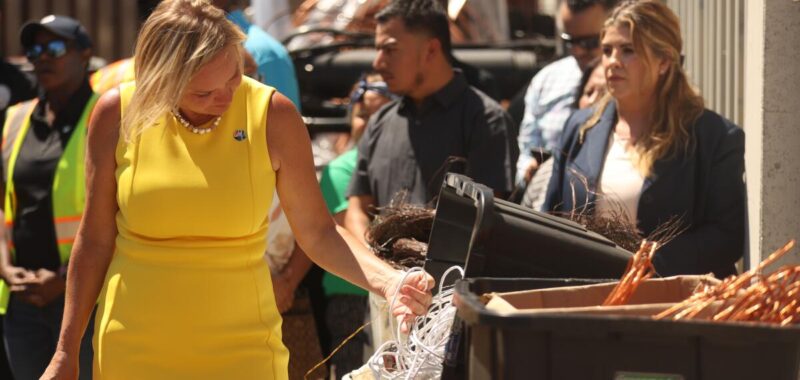
The Los Angeles City Council has dedicated an additional $200,000 toward the copper wire task force, tripling the funds focused on curtailing the theft of metal from public infrastructure.
Peter Brown, Councilmember Kevin De León’s communications director, said the initiative, dubbed the heavy metal task force, is the “most aggressive and proactive effort” to crack down on the thefts that have left predominantly working-class communities without adequate street lighting or internet service — and cost the city at least $17 million in repairs.
The money, which comes from De León’s discretionary funds, brings the total funding toward the endeavor to $600,000. It will be allocated to the Los Angeles Police Department, whose officers from Central, Newton, and Hollenbeck Divisions have led 26 operations in recent months, resulting in 82 arrests, 2,000 pounds of recovered copper wire and the confiscation of nine firearms.
Of the 82 arrests, 60 individuals are facing felony charges.
“This additional funding will enhance our ability to combat these destructive crimes and ensure that our neighborhoods can be safe and secure,” De León said in a statement Tuesday. “The success of the Heavy Metal Task Force sends a decisive message to criminals that Los Angeles will no longer allow you to use our city assets as your ATM. This ATM is closed. While we have had success with the results of the task force, we still have much more to do.”
Councilmembers Eunisses Hernandez and Hugo Soto-Martínez voted against the motion, which passed 12-2 Tuesday.
The streetlight outages are a “serious problem,” Soto-Martínez told The Times in a statement Thursday, but the issue may not necessarily be due to copper wire theft.
“We’ve discovered that around 70% of those outages are because of a lack of maintenance,” Soto-Martínez said. “Without seeing any data to suggest that this task force will actually prevent future vandalism and outages, our limited funds should be better spent in supporting the Bureau of Street Lighting in fixing lights that are currently out, while also supporting proven preventative measures like streetlight hardening and installing LED lights, which don’t use copper wire.”
Hernandez agreed and said she’d rather have resources devoted to efforts that “actually prevent thefts from happening in the first place,” such as the solar-powered street lights that were installed on streets in Van Nuys earlier this year.
Instead, she said in a statement, the city has been “doing the same thing over and over and expecting different results when it comes to copper wire theft.”
“Streetlights are out all over the city, and it currently takes almost a year to fix them, just for the cycle to repeat again,” Hernandez continued. “The Bureau of Street Lighting has started piloting solar powered lighting that eliminates the problem of copper wire theft and moves us closer to our renewable energy goals — but the City has only deployed a few hundred of these lights. It’s time to make investments in solutions that will get the lights back on for good.”
Hernandez and Soto-Martínez also voted against forming the task force in February, arguing that the endeavor focused more on punitive measures than prevention.
De León referenced the February meeting July 30 in a news conference announcing the results of the task force, saying the thefts were “not a victimless crime.”
The same day, De León and Councilmember Traci Park introduced motions instructing the Bureau of Street Lighting to brand its copper wire as city property and for City Atty. Hydee Feldstein Soto to draft an ordinance prohibiting the possession of telecommunications cable by any individual or business unaffiliated with telecommunications companies.
The council has yet to vote on those motions.

